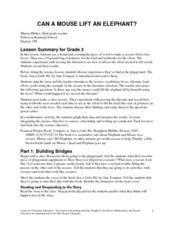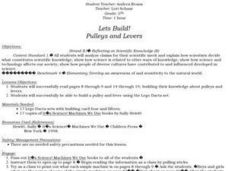Curated OER
First Class Lever Lab
In this first class lever learning exercise, learners investigate the mechanical advantage of this simple machine. Students change the effort arm and the resistance arm and calculate the resistance force, effort force and the mechanical...
Curated OER
What is a Class One Lever?
Fifth graders understand what a lever is, how it works and what the parts of a lever are. In this first class lever lesson, 5th graders label pictures and design a lab lever. Students predict the outcome of experiments with their lever...
Curated OER
Student Exploration: Levers
In this earthquake exploration learning exercise, students complete 2 prior knowledge questions, then use "Levers Gizmo" to conduct several activities, completing short answer questions when finished.
Curated OER
Can a Mouse Lift an Elephant?
Read Just a Little Bit, by Ann Tompert as an introduction to levers. Discuss playground seesaws and then turn learners loose to experiment with the placement of a fulcrum. Their goal is to determine where to place it in order to lift ten...
Teach Engineering
The Advantage of Machines
Show your students how to make their work easier. The first instructional activity in a series of 10 introduces the class to work and the way simple machines can be make work easier. The simple machines scholars can find in everyday...
Curated OER
Levers
Fifth graders participate in a review discussion of the parts of a lever, resistance or load, fulcrum, and effort. Next, they complete activities at six experiment stations while collecting data that they share with the class. While...
Curated OER
Levers
In this levers worksheet, students compare the three classes of levers. Students determine how the location of the fulcrum effects the amount of force needed. Then students complete 20 fill in the blank questions and 6 word problems.
Curated OER
Balanced Students
Students investigate the relationships between weights, and construct a balanced first class lever. They formulate a general equation for the relationship explored in the experiment and perform calculations.
Curated OER
Science-- "Moving the World?"- Learning About Levers
In this levers worksheet, students read a one page information text about the three classes of levers. Students then analyze 10 pictures of simple machines and circle the fulcrum point. Students classify each machine according to the...
Curated OER
Pulleys and Levers
Fifth graders explore the concept of pulleys and levers. They read and discuss text from the book "It's Science! Machines We Use," and in small groups construct a simple lever and pulley using a Lego Dacta set.
Agriculture in the Classroom
Six Kinds Do It All
Teach young engineers that all machines, no matter how complicated or complex, are made up of just six simple devices with this hands-on physical science lesson. Using the included templates, students first create paper models of...
Curated OER
Positioning the fulcrum in class one levers
Pupils explore the relationship between force and the distance of the load from the fulcrum. In this experimental lesson plan students get into groups and make a lever and record the force that is needed to move it, they then try this...
Curated OER
Inverse (Indirect) Machines
Students observe relationships between quantities. Students complete activities for three different classes of levers. In groups, students build each type of lever. Students identify levers in their daily surroundings. Students observe...
Curated OER
Using Fulcrums
Students engage in a lesson plan that concentrates on the use of a lever and fulcrum. They define how a lever is used to lift a load. The lesson plan has background information to justify it. Students demonstrate how to use the lever...
Curated OER
Levers - An Interactive Lesson
Seventh graders identify the different parts of a lever. In this physics lesson, 7th graders draw a lever and label the different parts. They use the interactive board to create their own lever.
Curated OER
Exploring Levers
Young scholars examine the parts of a lever system and their functions. In this simple machines lesson students study the different classes of levers and what they are used for.
Cornell University
Catapults
Ready, aim, fire! Launch to a new level of understanding as scholars build and test their own catapults. Learners explore lever design and how adjusting the fulcrum changes the outcome.
Cornell University
Catapult
Studying levers couldn't be more exciting! Learners build their own catapults and test the results as they make adjustments to the fulcrum. They compete against other groups to create the most accurate apparatus.
Teach Engineering
A Simple Solution for the Circus
Class members are challenged to design a device that will move a circus elephant into a train car. Groups brainstorm ideas that use simple machines to load the elephant. They then choose one of their ideas, sketch a plan, and present it...
Curated OER
Levers
Students compare and contrast the three different types of levers. In this physics lesson, students hypothesize how ancient Egyptians use them to build structures. They construct their own lever after teacher approves their design.
Curated OER
Levers
In this levers worksheet, students review how to calculate mechanical advantages using forces and using distance. Students explore the three types of levers. Then students complete 20 fill in the blank questions and 6 problems to solve.
Curated OER
The Lever Family
In this lever instructional activity, students determine the ideal mechanical advantage for different classes of levers. This instructional activity has 6 problems to solve.
Curated OER
Smoses Toy Expo
Students research one of the simple machines listed in the lesson and review several simple machine websites to complete their research. Students use software and a watch a video to learn more about machines. Students create a poster...
Curated OER
Cyber Chow Combos
Using a worksheet that's embedded in the plan, elementary schoolers must come up with the most possible combinations of food they can order from the menu on the worksheet. The lesson is meant to be done independently by everyone, then...

























